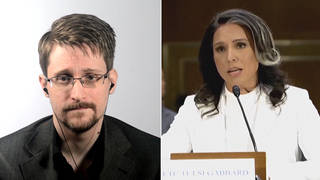
Topics
The Colorado ACLU obtained the documents that the FBI collected the names and license plates of several dozen activists involved in non-violent protests against a 2002 convention of the North American Wholesale Lumber Association. [includes rush transcript]
We look at a story about the FBI’s Joint Terrorism Task Force conducting surveillance of protesters in Colorado.
Last week the American Civil Liberties Union of Colorado released once secret FBI documents that show the agency’s Joint Terrorism Task Force monitored environmental activists involved in non-violent protests against a 2002 convention of the North American Wholesale Lumber Association.
The documents confirm that the names and license plates of several dozen activists are in a FBI file marked “counterterrorism”. The Colorado ACLU has also played a leading role in exposing the Denver police spy file controversy. In 2002 residents of Denver learned the city’s police department had been monitoring lawful political activities and keeping files on the political associations of city residents.
- Mark Silverstein, legal director of the Colorado American Civil Liberties Union.
Transcript
JUAN GONZALEZ: We’re joined now from Colorado by Mark Silverstein, the legal director of the Colorado ACLU.
AMY GOODMAN: Welcome to Democracy Now!, Mark.
MARK SILVERSTEIN: Thank you. Thanks for having me on the show.
AMY GOODMAN: Can you talk about what you have just exposed?
MARK SILVERSTEIN: Well, last week, we released some documents that we received from — in response to a long-pending request under the Freedom of Information Act. This is the third time that we have received a few documents. They’re sort of dribbling in. You know, every few months we get a few more. And the documents, I think, raise some questions about just what the F.B.I. Joint Terrorism Task Force is doing with regard to monitoring and collecting information on peaceful, non-violent protest activity, and raises questions about what the F.B.I. regards as domestic terrorism or potential domestic terrorism. We have had a number of files now that indicate that what we regard as non-violent dissent is regarded in F.B.I. circles as domestic terrorism or potential domestic terrorism that merits some kind of monitoring and information collecting and surveillance.
One of the documents we released last week was the F.B.I.'s documentation of what it calls a preliminary investigation or preliminary inquiry about anti-war protests planned in 2003, and the F.B.I. report indicates that from monitoring various websites, the F.B.I. learned of this anti-war protest that was planned, and so they asked that this investigation be opened. It also indicated that they got website information from Nextel, a private company. It's not clear what kind of website information the F.B.I. obtained, but it raises questions about whether the F.B.I. got this information — got information that’s not available simply by, you know, reading the website. And you wonder how is the F.B.I. able to obtain this information. Does the company just voluntarily give up subscriber information or how it was obtained?
The other document shows that the F.B.I. monitored protests that were planned in conjunction with the convention of the North American Wholesale Lumber Association. The protests were planned by forest activists, who wanted to protest the timber industry’s forest policies. And the F.B.I. report indicates that by monitoring messages on the internet, the F.B.I. learned that the protesters were planning non-violence training in advance of the protests. And the F.B.I. determined that that was enough to open an investigation and monitor this event. The protests were non-violent. There were a few people arrested for trespass, because they hung a banner from the property of the convention hotel. And, of course, trespass is not activity that’s protected by the First Amendment, but it’s hardly domestic terrorism.
The documents also confirm that the F.B.I. requested and received a list of all of the license plate numbers of persons that were perceived to be participants in the protest, and then the vehicle registration information that corresponds to those license plate numbers, which, of course, includes names and addresses, and the F.B.I. apparently appended this three-page document to the file.
AMY GOODMAN: Mark, we’re going to have to leave it there, but I know on your website, Colorado ACLU, you have the documents. Where can people go?
MARK SILVERSTEIN: Yeah. ColoradoACLU.org.
AMY GOODMAN: And we will also link to that on our website at DemocracyNow.org.












Media Options